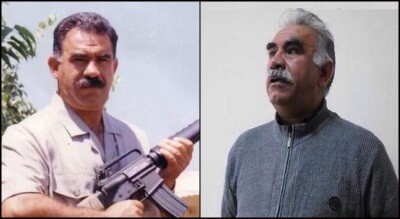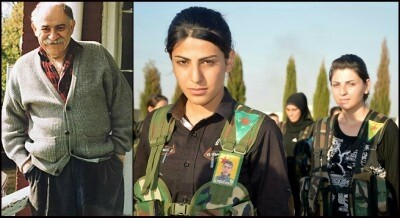Turkish forces (right) went into action January 20 to annihilate the YPG (left), the U.S.-backed predominantly Kurdish militia most responsible for destroying ISIS in Syria. |
On January 20, Turkey invaded the Kurdish region of northwestern Syria to destroy what it calls a terrorist army. No, it is not fighting ISIS. It is, quite the contrary, fighting the American-backed militia that effectively destroyed ISIS and helped liberate the city of Raqqa last October.
According to Turkey’s increasingly authoritarian President Recep Tayyip Erdoğan, the Kurdish People’s Protection Units (YPG) are a terrorist organization backed by the United States. That sentence right there ought to be enough to make you doubt what Erdoğan is selling right now, but perhaps you aren’t sure. Few in the West know much about the YPG. Most Americans have not even heard of it. And if all a person knows about it is that it’s an armed group in Syria, of all places, that a NATO ally calls a terrorist organization, well...Syria is full of terrorists, isn’t it?
Syria is indeed full of terrorists, but the YPG is one of the few armed factions in the war that adheres to moral Western warfighting norms. It’s also one of the precious few factions that’s genuinely pro-Western.
The YPG is one of the few armed factions in Syria that adheres to moral Western warfighting norms.
The YPG is backed by the Pentagon and 2,000 American soldiers as part of Washington’s plan to effectively control 28 percent of Syrian territory so that ISIS cannot come back. It’s mostly made up of ethnic Kurds, although there are Arab, Assyrian Christian and foreign fighters mixed into the ranks, including women in the Women’s Protection Units. They are the armed wing of the Democratic Union Party, founded in 2003.
Their ideology isn’t Islamist. It’s leftist. They champion, in their own words, “social equality, justice and the freedom of belief” along with “pluralism and the freedom of political parties.” They hope to implement “a democratic solution that includes the recognition of cultural, national and political rights, and develops and enhances their peaceful struggle to be able to govern themselves in a multicultural, democratic society.” They describe themselves as libertarian socialists, a minority faction within the worldwide socialist movement that rejects one-party rule and authoritarian state control of the economy.
Abdullah Öcalan (before capture and today) has moderated his ideas in prison. |
They also ascribe to what they call Communalism, a set of ideas put forth by Abdullah Öcalan, founder of Turkey’s Kurdistan Worker’s Party (PKK). It is here that the YPG gets itself into trouble with Turkey.
Öcalan founded the PKK in 1978 as a Kurdish nationalist separatist movement and a Marxist-Leninist insurgency. Like nearly all communist guerrilla armies—from Peru’s Shining Path to the Khmer Rouge in Cambodia—it was inherently prone to terrorism. While primarily striking Turkish soldiers and police officers, the group has also committed a number of attacks against civilian targets, including a car bomb in Ankara last March that killed dozens and wounded more than 100 and a suicide attack in Istanbul’s Taksim Square in 2010.
The so-called Kurdistan Freedom Hawks (TAK) take credit for some of the worst attacks against Turkey. Experts disagree about whether or not the TAK is linked to the PKK, but at the very least it’s a breakaway faction and is far more linked to the PKK than the YPG in Syria is.
The YPG is heavily influenced by the writings of leftist social theorist Murray Bookchin, with whom Öcalan began corresponding in prison. Bookchin’s emphasis on gender equality is particularly evident. |
In 1999, Öcalan was arrested in Kenya by Turkish intelligence officers, swiftly dispatched to Turkey and sentenced to death. He’s still alive, though, because Turkey abolished the death penalty, hoping that would boost its chances of being admitted to the European Union. Today Öcalan languishes on Imrali, a penal island in the Sea of Marmara.
While in prison, Öcalan watered down his communist ideology into the so-called libertarian socialism that it is now. And it is this ideology, not the old school quasi-Stalinist one of the PKK’s past, that the YPG adheres to today.
The PKK still behaves as a terrorist organization. Old habits from the 1970s don’t go down easily. The YPG, though, didn’t even exist until 2003. It never went through a communist or a terrorist phase, and it takes its inspiration from the milder version Öcalan promoted after he mellowed in prison.
The Turkish government has never been able to identify a single act of terrorism committed by the YPG.
The YPG is asking for trouble by borrowing anything at all from Abdullah Öcalan, but it has never committed an act of terrorism in Syria or anywhere else, not even at a time when terrorist attacks are as routine as weather in Syria. So while, yes, the YPG and the PKK are ideologically linked, the Turkish government has never been able to identify a single act of terrorism the YPG has ever committed, not in Turkey, not in Syria, nor anywhere else.
One can understand why the YPG gets Erdoğan’s hackles up, but gunning for these people makes no more sense than bombing South Africa in the early 1990s because then-President Nelson Mandela used to be a communist, never minding that his party, the African National Congress, did not even attempt to build a communist state after winning elections.
Whatever you think of the “libertarian socialism” of Syrian Kurdistan, it’s not even in the same time zone as the medieval totalitarianism of ISIS, the secular nationalist tyranny of Assad’s Arab Socialist Baath Party regime in Damascus or the Putin-esque rule of the neo-Ottoman Erdoğan.
Turkey can call the Kurds terrorists all they want, but that will not make them so.
Michael J. Totten is a contributing editor at The Tower, a Middle East Forum writing fellow, and the author of seven books, including Where the West Ends and Tower of the Sun.








